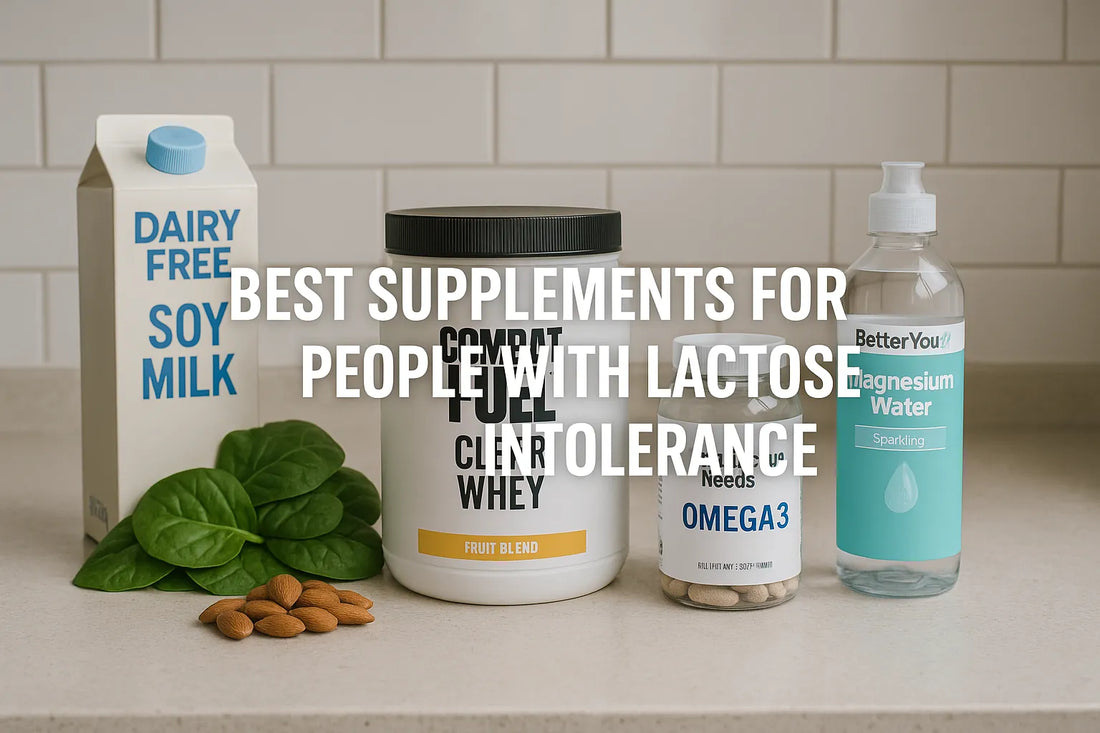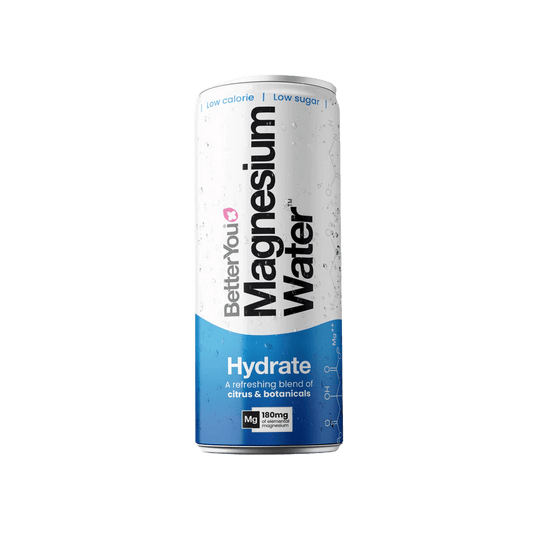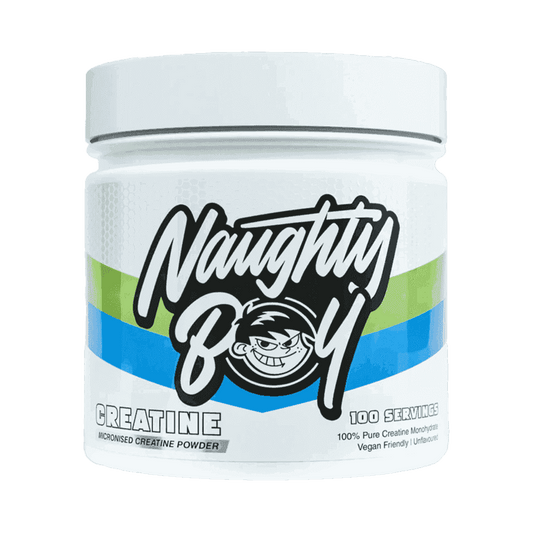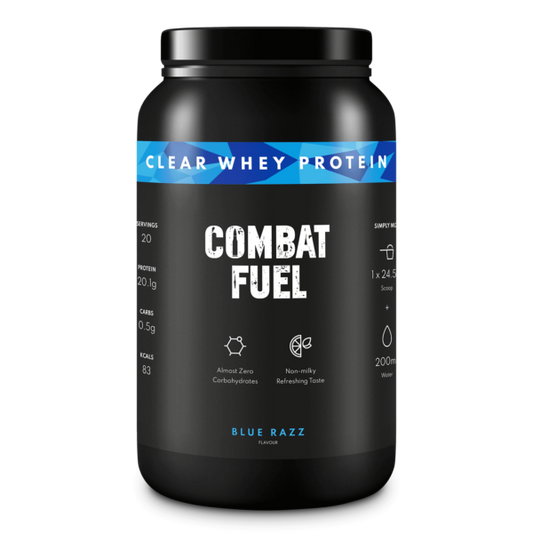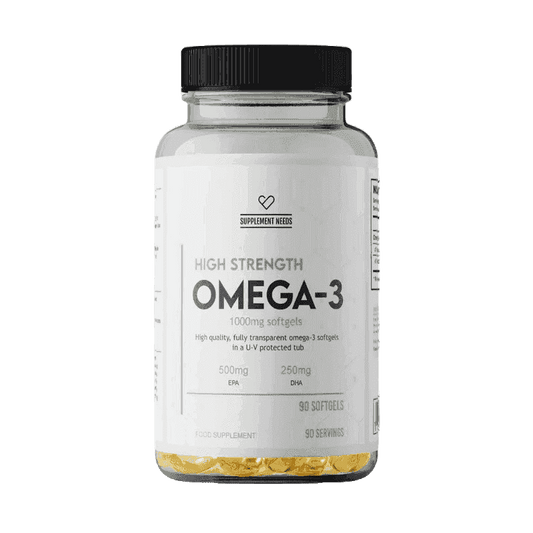Introduction: Life Without Dairy Doesn’t Mean Missing Out
Lactose intolerance affects millions of people in the UK — and for many, it can feel like a nutritional roadblock. Dairy products are traditionally celebrated for their protein, calcium, and vitamin D content. They’re marketed as the backbone of strong bones, healthy muscles, and post-gym recovery. But what happens when your body simply can’t handle lactose?
The good news is this: being lactose intolerant doesn’t mean you have to miss out on essential nutrients. It just means you need to be smarter about where you get them from. Supplements can bridge the gap left by dairy, making sure you still get the calcium, vitamin D, protein, and recovery support your body needs — without the side effects of bloating, cramps, or digestive discomfort.
This blog will walk you through the best supplements for people with lactose intolerance, why they matter, and how to use them daily to stay strong, healthy, and energised.
1) What Vitamins Should I Take if I’m Lactose Intolerant?
Cutting out dairy means missing out on some of the vitamins and minerals most often associated with milk and cheese. The top ones to consider are:
-
Calcium → essential for strong bones, teeth, and muscle function.
-
Vitamin D → helps your body absorb calcium and supports immunity.
-
Vitamin B12 → sometimes lower in dairy-free diets, especially if you also limit animal products.
💡 A smart place to start is with a multivitamin that covers all three. Applied Nutrition Multi-Vitamin Complex is an excellent choice — gluten-free, lactose-free, and designed to plug common gaps. It ensures that even without dairy, you’re covered for the basics every day.

2) What Supplements Should I Take if I Am Dairy Free?
Living dairy-free means thinking strategically. While plant-based milks often come fortified with calcium and vitamin D, it’s not always enough — especially if you’re active. That’s where supplements come in.
-
Calcium tablets or powders to replace the mineral once provided by milk.
-
Vitamin D3 to ensure absorption and strong immunity.
-
Protein powders that are lactose-free for recovery and muscle building.
💡 Combat Fuel Clear Whey is a standout here. Unlike regular whey concentrate (which contains lactose), clear whey isolate is filtered to remove nearly all lactose, leaving you with a light, fruit-flavoured protein shake that’s easy on digestion. It’s ideal for gym-goers who want to avoid dairy without sacrificing recovery.
3) What Can I Take Daily for Lactose Intolerance?
The best routine is a simple one. Daily supplementation ensures your nutrient intake stays consistent without you having to constantly track every food source.
For most people, a smart daily stack includes:
-
Multivitamin → overall coverage (calcium, vitamin D, B12).
-
Omega-3 → supports heart health and inflammation control, especially useful if dairy-free living overlaps with a lower fish intake.
-
Protein powder → for recovery and strength, especially if gym-active.
💡 Supplement Needs Omega 3 is clean, high-strength, and lactose-free. Adding this daily helps balance inflammation, support joint health, and protect your cardiovascular system — all areas that benefit from a dairy-free supplement stack.

4) Is There a Daily Supplement for Lactose Intolerance?
No single capsule “fixes” lactose intolerance — it’s not that simple. But the closest thing is building a consistent daily routine. Think of it as a three-part system:
-
Multivitamin (for calcium, vitamin D, B12).
-
Omega-3 (for inflammation, brain, and heart support).
-
Protein shake (for recovery, muscle repair, and overall energy).
Together, these cover the major nutrients you’d usually rely on dairy to provide. Unlike lactase enzyme tablets (which only help in the moment), this daily supplement system builds long-term resilience and health.

5) Can Lactose Intolerance Cause Vitamin Deficiency?
Yes — and this is often overlooked. If your diet isn’t carefully planned, lactose intolerance can lead to deficiencies, especially in:
-
Calcium → increases risk of weaker bones and injuries.
-
Vitamin D → lower without fortified dairy products.
-
Vitamin B12 → may drop if your diet is both dairy-free and low in meat.
Supplements prevent these deficiencies before they become problems.
💡 One underrated helper here is BetterYou Magnesium Water. While not directly tied to dairy, magnesium supports muscle function, energy, and bone health. Pairing magnesium with calcium and vitamin D makes for a strong “bone health trio” — perfect for those missing dairy in their diet.
✅ What We’ve Looked Into So Far
-
The key vitamins often missing in lactose-intolerant diets (calcium, vitamin D, B12).
-
Why multivitamins, omega-3, and protein powders are the foundation of a dairy-free supplement stack.
-
Why there’s no single “daily pill” for lactose intolerance, but a smart combination works best.
-
How deficiencies can sneak up on you if you don’t plan around them.
And we’ve highlighted four core products that support a lactose-free lifestyle:
- Applied Nutrition Multi-Vitamin Complex
- Combat Fuel Clear Whey
- Supplement Needs Omega 3
- BetterYou Magnesium Water
🔜 Part 2 will cover:
-
Do lactose-intolerant people need supplements?
-
Which deficiencies are linked to dairy-free living.
-
Whether calcium supplements are necessary.
-
The best proteins for gym-goers with lactose intolerance.
-
Lactaid tablets: safe daily or not?
-
FAQ and conclusion.
Best Supplements for People With Lactose Intolerance (Part 2)
6) Do Lactose Intolerant People Need Supplements?
Not everyone with lactose intolerance needs supplements — but many benefit from them. If your diet is rich in fortified plant-based milks, oily fish, leafy greens, and protein-rich foods, you may be fine without extras.
But here’s the reality:
-
Many plant milks aren’t fortified enough.
-
Getting enough calcium from greens alone is tough.
-
Vitamin D is a challenge for nearly everyone in the UK.
That’s why supplements act like an insurance policy — giving you consistency where diet alone may fall short. Even if you eat well, a good multivitamin or omega-3 capsule ensures your bases are covered every day.
7) Which Vitamin Deficiency Causes Lactose Intolerance?
This is a common misconception. No vitamin deficiency causes lactose intolerance — it’s caused by the body producing little or no lactase enzyme, which is needed to digest lactose.
However, unmanaged lactose intolerance can cause deficiencies, because you’re avoiding dairy products that normally provide calcium, vitamin D, and B12. Over time, this can affect bone strength, energy levels, and immunity.
That’s why it’s important to actively replace these nutrients through supplements like Applied Nutrition Multi-Vitamin Complex and BetterYou Magnesium Water — both safe, lactose-free, and designed to prevent long-term issues.

8) Should I Take Calcium Supplements if I Am Lactose Intolerant?
For many, the answer is yes. Without dairy, calcium intake often drops below recommended levels. Long-term, this can increase the risk of osteoporosis and bone fractures.
A calcium supplement is especially important if:
-
You don’t consume fortified plant-based milks.
-
You’re post-menopausal (higher risk of bone loss).
-
You’re an athlete putting strain on bones and joints.
💡 The best approach is pairing calcium with vitamin D to improve absorption. A daily multivitamin like Applied Nutrition Multi-Vitamin Complex covers both, ensuring your body gets what it needs for bone strength.
9) What Protein Should I Take if I’m Lactose Intolerant?
Protein is where many people with lactose intolerance struggle. Regular whey concentrate often contains too much lactose, leading to bloating and discomfort. But you’ve got options:
-
Clear whey isolate: like Combat Fuel Clear Whey, filtered to remove lactose, light, and fruit-flavoured.
-
Vegan proteins: blends of pea, rice, or soy protein — naturally lactose-free.
-
Egg white protein: another lactose-free option, though less common in the UK.
For gym-goers, clear whey isolate is usually the best balance of taste, digestion, and performance. It provides fast-digesting protein without the heaviness of standard whey.

10) Is It Bad to Take Lactaid Pills Every Day?
Lactase enzyme tablets (like Lactaid) can be useful for occasional meals that contain dairy. They help break down lactose so you can enjoy foods like pizza or ice cream without digestive discomfort.
But here’s the key:
-
They don’t treat lactose intolerance.
-
They don’t provide nutrients like calcium or vitamin D.
-
Relying on them daily isn’t harmful, but it also doesn’t solve long-term deficiencies.
Think of Lactaid as a short-term tool, not a daily foundation. Supplements like Combat Fuel Clear Whey, Omega-3, and a multivitamin do the heavy lifting for health and recovery.
🧠 FAQ: Supplements and Lactose Intolerance
1. What supplements should I take if I’m lactose intolerant?
Multivitamin, calcium, vitamin D, omega-3, and a lactose-free protein powder.
2. Is whey protein bad for lactose intolerance?
Standard whey concentrate can cause issues, but clear whey isolates (like Combat Fuel Clear Whey) are safe.
3. What’s the best protein for lactose-intolerant gym goers?
Clear whey isolate or plant-based protein blends.
4. Do lactose-free supplements work as well?
Yes — they provide the same nutrients without the lactose.
5. How do I build muscle with lactose intolerance?
Focus on protein intake from safe sources, creatine, omega-3, and multivitamins. Naughty Boy Prime Creatine is completely lactose-free and ideal for muscle growth.
Conclusion: Building Strength Without Dairy
Lactose intolerance doesn’t mean you’re destined for nutrient deficiencies. With the right supplements, you can cover your bases, fuel your workouts, and stay healthy long-term.
-
Multivitamins → for calcium, vitamin D, and B12 coverage.
-
Omega-3 → for inflammation, brain health, and energy.
-
Calcium → if diet doesn’t provide enough.
-
Protein powders → clear whey or plant-based, to fuel recovery.
-
Creatine → completely safe, dairy-free, and brilliant for muscle growth.
💡 Products like Combat Fuel Clear Whey, Applied Nutrition Multi-Vitamin Complex, Supplement Needs Omega 3, and BetterYou Magnesium Water give lactose-intolerant people a toolkit for strength, recovery, and overall wellness — without a single drop of milk.

